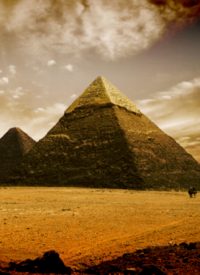
The military junta that ended up siding with anti-regime protesters has accused foreign-funded “activists” — including more than a few Americans working for U.S. government-financed organizations — of undermining the new rulers and supporting protests. Criminal inquiries into the groups’ activities are ongoing.
At least six Americans and numerous other foreigners, some whom were working for the U.S. government-funded International Republican Institute or the National Democratic Institute, have been barred from leaving the country as the investigations continue. Several U.S. nationals are taking shelter at the U.S. embassy in Cairo, the State Department said.
“We do not feel that they are in physical danger at the moment. That is a different matter than whether they are being persecuted in the Egyptian judicial system,” U.S. State Department spokesperson Victoria Nulan told NPR, noting that the situation would be discussed by the Obama administration and a delegation of Egyptian generals currently in Washington.
Meanwhile, Congress has imposed new conditions on the Egyptian government that it must meet before receiving any more American tax money. The U.S. government gives billions in aid to Egypt every year for “security” and other purposes, but those taxpayer funds will now be contingent on the nation moving toward “democracy” and respecting the “rights” of the federal government’s “Non-Governmental Organizations” (NGOs).
But so-called democracy in Egypt has not turned out quite like everyone backing the Arab Spring had hoped. Recent elections handed more than two-thirds of the new Parliament to the Muslim Brotherhood and other radical Islamist parties. And while the Brotherhood has promised to respect individual rights, not everybody is convinced.
The Supreme Council of Armed Forces still holds most of the real power in Egypt as a Constitution is drafted and the nation awaits presidential elections. Still, tensions are quickly escalating between the junta and activists seeking civilian rule. As usual, the U.S. government is getting involved, too.
Some analysts have encouraged Obama to continue supporting the military council in an effort to defend “U.S. interests” in the region, protect the Coptic Christian minority, and avoid the creation of an anti-Israeli theocracy on the Jewish state’s border. Others, however, are urging the administration to support “democracy” and, by extension, the elected Islamist government.
The whole situation has forced the Obama administration into an awkward position. Either it supports the ruling military regime and abandons any pretense of backing “democracy,” or it throws its weight behind the elected parliament dominated by radical Islamists. The constitutional option of non-intervention appears to be off the table for now.
But as Obama’s role in Egypt continues to attract media coverage, tensions simmering beneath the surface within the country could explode at any time, too. The main factions within Egypt’s current political climate appear to be hard-line elected Islamists, the ruling military junta, and the young revolutionaries — largely perceived as more liberal and secular.
The Brotherhood and the military junta, meanwhile, are increasingly seen as allies by observers — especially considering the Islamists’ calls to keep the military in power as government institutions are developed and strengthened. But the situation has angered and alienated significant segments of the Egyptian population.
Many pro-“democracy” revolutionaries are unhappy with the overwhelming victory earned by Islamists in parliamentary elections. And across the political spectrum, Egyptians are becoming increasingly weary of the once-popular military council’s unchecked power behind the scenes. Demands for an immediate transfer of power to a civilian body are growing daily.
On the one-year anniversary of the uprising that ultimately toppled Egypt’s long-ruling U.S.-backed dictator Hosni Mubarak, citizens once again poured into Tahrir square — the epicenter of the revolution. But the mood was not entirely joyful. In fact, hostility and suspicion were everywhere, according to news reports.
“I’m not here to celebrate or sing or dance. I came here to demand retribution for the killers of the revolution’s martyrs and those responsible for injuring protesters,” popular Islamic cleric Mazhar Shaheen told the assembled crowd. “It would be idiocy to celebrate while the parents of slain protesters are still shedding tears and while many others remain in detention.”
The Muslim Brotherhood, which controls by far the greatest number of seats in Parliament, also came under fire from critics at the square. Some protesters reportedly even hurled objects at the group during the gathering, according to news reports. But officials with the Brotherhood fought back against the criticism.
“We cannot separate the revolutionaries from the Brotherhood. The latter was established in 1928 during a state of revolution,” Ahmed Abou Baraka with the Brotherhood’s Freedom and Justice Party was quoted as saying. “It has fought injustice and seen tens of thousands of its members martyred in different eras, under presidents Nasser, Sadat and Mubarak.”
As tensions continue to escalate, U.S. authorities are urging the Egyptian government to lift its travel ban on the Americans under investigation. And with so much taxpayer “aid” money potentially at stake, it is probably only a matter of time before they are allowed to leave, according to analysts. One of the U.S. nationals being investigated is Sam LaHood, the son of U.S. Transportation Secretary Ray LaHood.
Even if the Americans are allowed depart without criminal prosecution, however, the domestic situation in Egypt could continue to deteriorate. Regardless of which faction ends up in control — the Muslim Brotherhood, the military junta, or an alliance of the two — the future does not necessarily look bright.
Related articles:
Egypt Islamists Win Big in Election, Sparking Fears
Egypt Revolt Leading to Military Dictatorship
Fanning the Flames of Revolution in Egypt
Google and U.S. State Dept’s Role in Egyptian Revolution
Egyptian Regime Kills Dozens of Christian Protesters
President Obama’s Role in the Arab Spring
Organized Chaos: Behind the Scenes in the Middle East
George Soros Allies with the Muslim Brotherhood
Self-avowed Muslim Marxist Says White House Tied to Muslim Brotherhood
Why the Arab Spring May Turn into the Usual Arab Winter
Egypt’s Mubarak May Face Death in Killings of Protesters
Foreign Aid: Borrowing From Peter to Pay Peter



